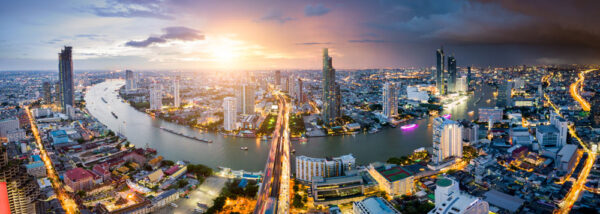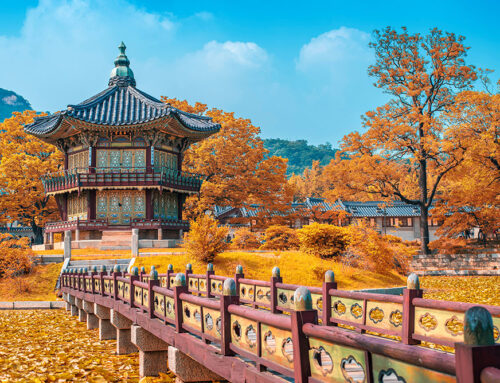Thailand, affectionately known as the “Land of Smiles,” beckons travelers with its colorful cultural tapestry, lush landscapes, and vibrant cityscapes. This comprehensive guide will take you through the bustling streets of Bangkok, the serene northern reaches of Chiang Mai, the pristine beaches of its famed islands, and the ancient city ruins that scatter the landscape. Whether you are an adventurer, a cultural enthusiast, or a beach lover, Thailand offers a rich and diverse experience that caters to all.
Let’s discuss what to see (and how to stay secure) in Thailand.

Top Attractions
Bangkok: The heart of Thailand pulses strongest in its capital, where tradition and modernity coexist seamlessly. The city’s architectural grandeur is best exemplified by the Grand Palace and Wat Pho, with their intricate designs and religious significance. For a taste of modern Bangkok, explore areas like Sukhumvit, known for its vibrant nightlife, luxury shopping, and fine dining. The city’s street food scene is unrivaled, offering everything from pad thai to mango sticky rice at bustling markets like Chatuchak.

Chiang Mai: Nestled in the mountainous region of Northern Thailand, Chiang Mai is a sanctuary of calm and spirituality, contrasting with Bangkok’s frenetic pace. The city is surrounded by temples that showcase Lanna architecture, with Wat Phrathat Doi Suthep being a must-visit for its stunning views and religious artifacts. The city’s artisan community thrives in local markets, where handmade crafts offer a glimpse into the cultural fabric of the region.
Islands: From the bustling Phuket with its luxurious resorts and vibrant nightlife to the tranquil Koh Phi Phi known for its crystal-clear waters and dramatic cliffs, Thailand’s islands offer paradisiacal escapes. Phuket is a hub for water sports, while Koh Phi Phi is ideal for those looking to explore marine life through diving and snorkeling. The quieter Koh Lanta offers a serene retreat, perfect for families and couples seeking peace.
Ayutthaya: Just a short trip from Bangkok lies Ayutthaya, a historic site that was once one of the world’s largest urban areas and a regional power for centuries. Its sprawling temple complexes, like Wat Chaiwatthanaram, offer a hauntingly beautiful look at Thailand’s past, with vast ruins that tell tales of its ancient grandeur.
Cultural Insights
 When visiting sacred sites, adhering to dress codes that respect local customs is crucial; this includes covering shoulders and knees. Understanding the significance of the monarchy in Thai culture is also essential; always display the utmost respect for imagery and references to the royal family.
When visiting sacred sites, adhering to dress codes that respect local customs is crucial; this includes covering shoulders and knees. Understanding the significance of the monarchy in Thai culture is also essential; always display the utmost respect for imagery and references to the royal family.
Thai cuisine is a cornerstone of the cultural experience, offering a diverse palette that ranges from spicy to sweet. Sampling street food is a direct dive into the heart of Thai culture, with local favorites like laab moo (spicy pork salad) and som tam (spicy green papaya salad) being perennial favorites.
Safety and Etiquette
Navigating Thailand safely involves respecting its rich tapestry of customs and traditions. Always use polite language, such as adding “kha” (for women) or “kahb” (for men) at the end of sentences to show respect. Security on Thailand should be addressed as well. Thailand is generally a safe destination for travelers, but like any popular tourist spot, it has its share of security issues that visitors should be aware of to ensure a safe and enjoyable trip. Here are specific security concerns to consider when traveling to Thailand:
Scams
- Tuk-tuk scams: Some tuk-tuk drivers offer tours at suspiciously low prices but take you to specific shops or restaurants instead, where they receive commissions.
- Gem scams: Tourists are sometimes tricked into buying worthless gems that are sold as high-quality or investment-grade.
- Grand Palace is closed scam: Scammers inform tourists that major attractions are closed for various reasons and then offer alternative, overpriced tours.
Pickpocketing and Petty Theft
Crowded tourist areas, markets, and public transportation hubs are common places for pickpocketing and petty theft.
Violent Crime
Although less common, incidents of violent crime, including assaults and muggings against tourists, can occur, particularly late at night or in less populated and poorly lit areas, particularly in heavy tourist beach towns.
Political Protests
Thailand has experienced political instability that sometimes results in protests and demonstrations. These can turn violent without warning and disrupt local transportation and services.
Road Safety
Traffic accidents are a significant risk in Thailand. The traffic laws and driving habits differ substantially from those in Western countries, and motorbike accidents are particularly common among tourists.
Natural Disasters
Thailand faces seasonal monsoons and flooding, particularly from July to October. Tsunamis and earthquakes can also occur.
Beach and Water Safety
Strong currents and dangerous waves at certain beaches pose risks. Jellyfish stings and other marine life dangers are also concerns in some areas.
Alcohol and Parties
Illicit drugs are sometimes used at parties and can lead to severe legal consequences, health emergencies, or unsafe situations due to impaired judgment.
Credit Card Fraud
Keep an eye on your credit card at all times and be cautious with where you use it. Skimming devices are sometimes used at less reputable establishments to steal card information.
Animal Encounters
From stray dogs in the cities to encounters with wildlife in rural areas, animals can pose unexpected risks. Rabies is a concern in some parts of the country.
Travelers are advised to exercise common sense and remain aware of their surroundings. Checking travel advisories, staying informed about local news concerning safety, and respecting local laws and customs are also crucial for a safe trip.
For personal or business security coverage while traveling abroad in Thailand, consider downloading FoneTrac for your security needs. The app provides risk assessments, a check-in and panic feature, and is backed by a team with decades of experience in the travel security field.

Practical Information
- Visas: For most travelers, entering Thailand does not require a visa for stays of up to 30 days, but this can vary based on nationality, so checking current visa requirements is recommended.
- Currency: The Thai Baht (THB) is the official currency, and while credit cards are widely accepted in cities, having cash is essential for smaller towns and rural areas.
- Best Times to Visit: The cool and dry months from November to February offer the most comfortable climate for exploring the wide array of outdoor and cultural activities available.
- Transportation: Thailand’s extensive network of buses, trains, and domestic flights facilitates easy travel between regions. In cities, options like the BTS in Bangkok provide efficient and affordable transit, bypassing the often-congested roads.
Conclusion
Thailand’s allure is timeless, offering an enchanting blend of history, culture, and natural beauty. Each visit brings new insights and pleasures, from the architectural wonders of its ancient cities to the welcoming smiles of its people.
Whether you seek the tranquility of a beachside retreat or the exhilaration of urban exploration, Thailand remains a compelling destination that promises unforgettable experiences for every traveler.
Now is as good as time as any to check out the Land of Smiles yourself!


